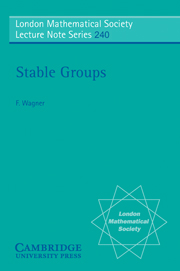3 - Groups & Grandeur
Published online by Cambridge University Press: 05 April 2013
Summary
In this chapter model theory will play a more prominent role. In the noughth section we shall lay the model-theoretic foundations for the subsequent chapters and introduce the notions of “foreign” and “internal” due to Hrushovski. This allows us to generalize the concept of “small” (e.g. finite) and “large” (e.g. generic) sets: a definable subset is “small” if the generic type is foreign to it, and “large” if the generic type is internal or analysable in it. It will turn out in section 1 that these notions are particularly well-behaved in the context of groups: if the generic type of a group is not foreign to some set X, then there is a definable X-internal quotient of the group. This means that quite often it is sufficient to consider only definable subsets which define groups. Furthermore there is some form of compactness: if a group is internal in a class of definable sets, then it is internal in a subset of them, of bounded cardinality.
In section 2, we shall consider various components of a stable group. In particular we shall define the Φ-component, which enjoys very strong connectivity properties. It is the intersection of all relatively definable subgroups not only of finite, but of “small” index (defined in terms of analysability of the whole group using the quotient), and it generalizes both the characteristic normal subgroup of monomial U-rank given by Berline and Lascar, and Hrushovski's p-connected component (where p is a regular type in which the group is internal).
- Type
- Chapter
- Information
- Stable Groups , pp. 142 - 187Publisher: Cambridge University PressPrint publication year: 1997



